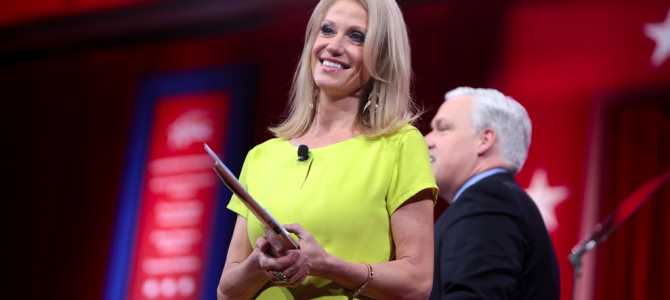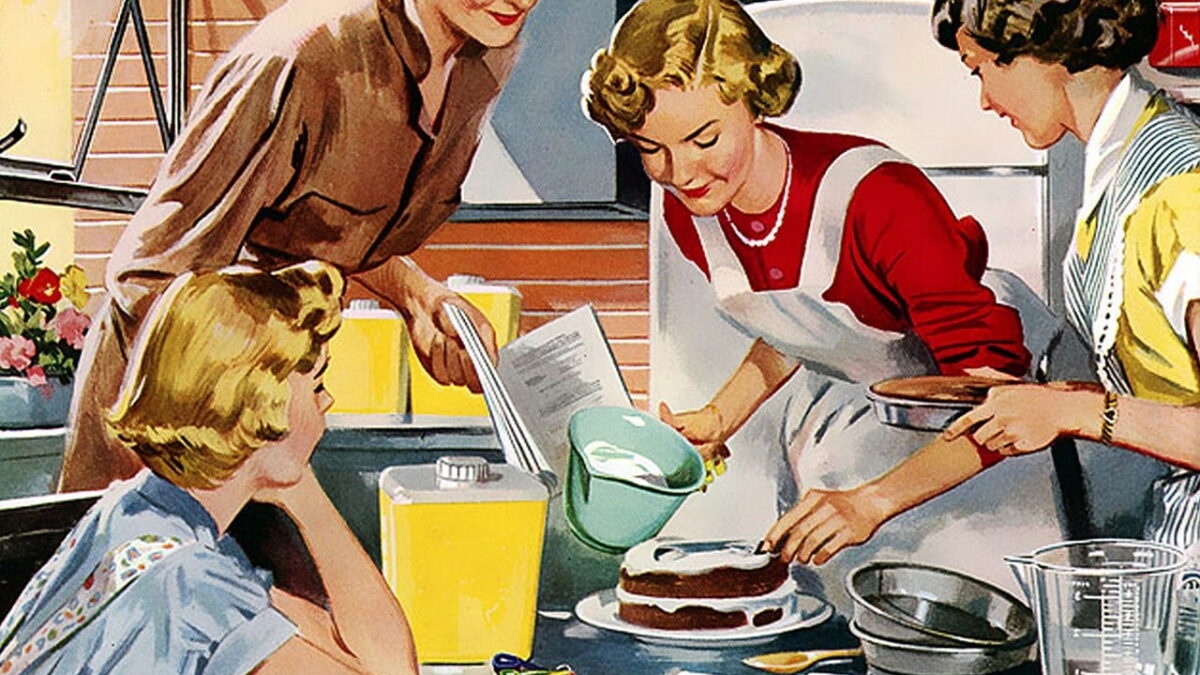
To its credit, the New York Times printed an article this week about sexist attacks on President Trump’s adviser and former campaign manager Kellyanne Conway: “Sexist political criticism finds a new target: Kellyanne Conway.”
What powerful political woman is mocked for her clothes, is the target of pictures on Twitter depicting her as haggard and is routinely called a witch and a bitch?
If you guessed Hillary Clinton, you’re right.
But if you guessed Kellyanne Conway, you’re right, too.
The Times spoke with various feminists, political professionals, and scholars about attacks on Conway and how they parallel those made on other powerful women: The witch memes, the word-that-rhymes-with-witch memes, the attacks on their hair, skin, clothes and age.
Conway became the first female campaign manager to oversee a winning presidential campaign in 2016, but the most famous “tribute” is probably the “Saturday Night Live” portrayal of her in the unhinged stalker role from “Fatal Attraction” threatening journalists over screen time.
The way she sat on a sofa became an entire news cycle and subjected her to crass sexual jokes from at least one Democratic congressman, who eventually gave a qualified apology. To her credit, Chelsea Clinton called on him to apologize, while Rep. Nancy Pelosi punted.
There is some debate in feminist circles as to how much defending Conway deserves when she headed up a campaign for a man who is on record saying openly crass and sexist things. This is an evergreen debate about conservative women, whom many feminists believe, at best, stand on feminist shoulders to join with men to impede women’s progress.
“I think some of the reticence that might be coming across in not a huge chorus of defense …is the feeling that she doesn’t have our back,” said Gillian Thomas, a senior staff lawyer of the Women’s Rights Project of the American Civil Liberties Union.
“It’s a shame,” Ms. Thomas continued. “If women were more united and speaking up at this behavior, including when it’s perpetrated by the left, we’d all be a lot better off.”
Feminist website Jezebel asks, “What Do Feminists Owe Kellyanne Conway?” With respect, it’s the wrong question. If feminists think Conway, a successful political professional, working mom, and entrepreneur in her own right long before she met Donald Trump, is a mere pawn of the patriarchy, why make the standards of behavior subject to her relationship to men they don’t like? You think there’s danger for women in a Trump presidency? Fine. The careers of Sen. Ted Kennedy and President Bill Clinton teach us there’s plenty of danger for women in changing the rules for behavior depending on the party of the perp.
As feminists know well, the sexist attacks wouldn’t disappear if she were liberal. Since when in feminist thought does the behavior of the victim mitigate the sins of the attacker?
The question is what feminists owe themselves, and intellectual consistency is a precious gift these days, more at a premium by the moment. Give that gift to yourself, like one of those diamond rings professional women buy themselves to subvert the expectations of the patriarchy.
Instead, in hubs of online feminism, there have been some painfully perfunctory denunciations of gross sexism. Take Slate’s parsing of model Emily Ratajkowski’s defense of first lady Melania Trump against accusations she’s a “hooker,” uttered by a New York Times reporter at a fashion event.
This one seems pretty cut-and-dried, and Ratajkowski’s tweets were just that.
Sat next to a journalist from the NYT last night who told me "Melania is a hooker." Whatever your politics it's crucial to call this out for
— Emily Ratajkowski (@emrata) February 13, 2017
what it is: slut shaming. I don't care about her nudes or sexual history and no one should.
— Emily Ratajkowski (@emrata) February 13, 2017
Gender specific attacks are disgusting sexist bullshit.
— Emily Ratajkowski (@emrata) February 13, 2017
A man with a considerable platform went after the first lady with the grossest of sexual and sexist accusations, and a woman with a platform called him out for it. Now, we all tweet slay, gurl, slay, right? Wrong.
So there you go: Don’t call anyone a hooker in the presence of Emily Ratajkowski, because she is not here for that. While protesting slut-shaming is a valid stance, if this seems like an annoying nontroversy, well, that might be an even more a valid stance. It’s not funny or amusing that a reporter saw fit to throw around the word hooker, but it’s also not clear that calling it out was the best use of Ratajkowski’s energies or platform.
This is Regina George feminism. It’s slut-shaming the shaming of slut-shaming. Keep your mouth shut, model, unless you’re saying exactly what I say you should in exactly the way I prescribe. You know, for solidarity. The piece acknowledges the apology of Jacob Bernstein in passing, the man who caused a “nontroversy” by calling the first lady a hooker in public, before moving on to nitpick Ratajkowski’s social media brand of “woke model.”
The headline attacks Ratajkowski for receiving thanks from Melania for defending her against charges she’s a “hooker,” saying it means “something is very wrong.” Something’s wrong, but it ain’t that.
In a better piece at Jezebel, we nonetheless find that feminists are pretty confused about very basic rules they have enforced for years. Like, don’t comment on the appearance of women in power, thus reducing them to a measure of their conformity to patriarchal beauty norms.
The latter rule is so strictly enforced, I was afraid during the primary season to say when Carly Fiorina looked utterly bangin’ in her sometimes delightfully unconventional clothes or compliment Hillary Clinton on a particularly flattering blazer.
With the same painfully perfunctory tone, like a toddler asked to apologize to her sister, the writer grudgingly does her “duty as a woman, [saying] Peterson is right, comparing Conway’s looks to Skeletor is sexist, boring, and cliché. There are undoubtedly ways to satirize Conway without resorting to traditional frames of misogyny; ways to delegitimize her power without bothering about her complexion.”
Do you sense a but? There’s a but. But, you see, the way Conway presents herself is itself a political message that must be combatted, therefore conveniently putting her appearance back on the table as valid political critique.
First, let me concede there’s a fine line when it comes to clothing. I don’t think it should be off-limits. It’s fun to talk about, it’s undeniably an important part of how women in the public eye present themselves, and it offers a pleasant contrast to the stultifying universe of men’s fashion choices, particularly in politics.
But the issue of Conway’s appearance—both her clothes (apparently it’s sexist to criticize her clothes) and her body—still remains.
Her body, too, huh? The idea that Conway’s choice to wear dresses and style her hair long makes her essentially a walking talking point for Trump’s worldview is nonsense. Oh, but we’re digging in:
“But there’s an odd framing of Conway’s appearance here as a politically neutral entity or, worse yet, a bold resistance of the expectations of an aging woman, feminist in its own right. But the presentation of the body, particularly Conway’s representation of herself as trenchantly feminine, is by no means neutral. Indeed, the body and the rhetoric that surrounds it is central to Trump’s worldview reflected in both speeches and policies. Trump’s political deployment of the body is, more so than the internet’s casual sexism, perhaps the greatest challenge to feminism.”
This is just pseudo-intellectualizing of “haha, what the F is Kellyanne Conway wearing?” or “she looks like a walk of shame today.” If you’re gonna go there, just, ahem, lean in.
I’m right-of-center, Trump-critical, often disagree with Conway, and I wear dresses and long hair. So do many liberal women in my line of work. Do trolls have license to go after my physical attributes because my embrace of “femininity,” which looks the same as my liberal colleague’s work clothes, perpetuates a patriarchal system of oppression? Is my sleeveless sheath just another arrow in my quiver of hegemony?
No, that’s just people wanting to find an excuse to make fun of women in the same ways men have made fun of women for years and pat themselves on the back for it.
I’m not an expert, so I’ll quote someone who is. This criticism of Conway’s look sounds very much like the other side of the emasculating-powerful-woman attacks used on Hillary: “Whereas Hillary is called castrating or shrewish, Conway is often called a slut. The implication is that she is using femininity to control men,” Marjorie J. Spruill, author of “Divided We Stand: The Battle Over Women’s Rights and Family Values That Polarized American Politics” told the Times.
Feminist writers keep a running tally of starlets and pop stars who aren’t sure they want to identify as “feminist” when asked. Katy Perry, Taylor Swift, Kelly Clarkson, and even Beyonce have transgressed by being too uncertain about whether and how they embrace the label. The chorus of criticism ensues: “Why would you not embrace ‘feminism’? It just means equality of the sexes!”
The definition of feminism is technically clear, but the feminist movement is often not. It’s about equal treatment of the sexes until it’s about different standards for women. It’s about women and men being capable of all the same things unless it’s about the special circumstances for which women must be compensated. It’s about being empowered until it’s about a indecipherable hierarchy of privilege and victimhood. It’s about equality of the the genders until it’s about using the exact right verbiage to refer to the many other genders about which you may or may not have been briefed in the last three weeks (I’m not being flippant; it changes quickly). It’s about all women until it’s about a civil war between white feminists and WOC. It’s about the choice to treat one’s body as one wants until one’s choice is to wear a dress and work a job feminists don’t like. Or, work that job without wearing red on A Day Without a Woman.
These tepid denunciations of sexism, which morph into justifications of a more tepid form of sexism, are just another example of how the target is in constant motion for being a good feminist. I bet Ratajkowski thought she was safely in the right by denouncing a man who called the first lady a hooker, but she wasn’t.
This week alone, a female British TV and radio presenter denounced Emma Watson’s lovely Vanity Fair shoot in the name of feminism, telling her to put her breasts away if she’d like to have thoughts (to her credit, Gloria Steinem forcefully backed Watson). Media trumpeted the Brawny paper towels brand’s decision to put a woman on its packaging for Women’s History Month as part of its #StrengthHasNoGender campaign. Because someone was finally brave enough to make a woman the face of a household cleaning product! For progress. And on International Women’s Day, the feminist movement told women not to work outside the home.
Is it any wonder, when women are asked whether they’re “feminists,” they don’t know exactly what they’re committing to?









